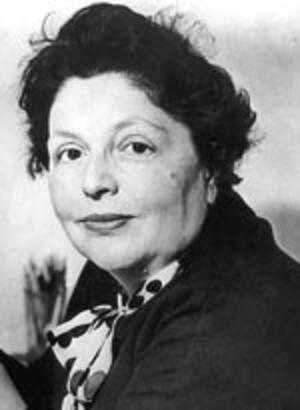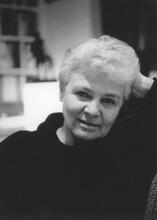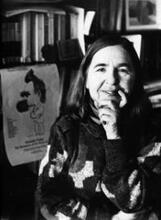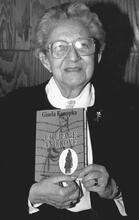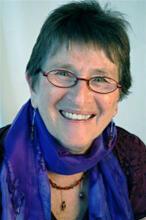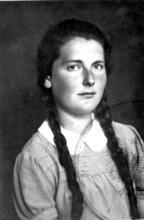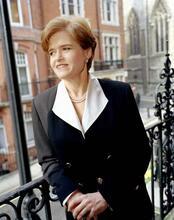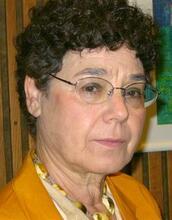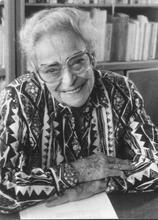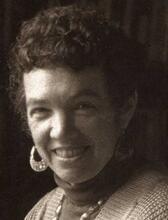Lucy S. Dawidowicz
Historian and author Lucy S. Dawidowicz (1915 - 1990) was a controversial figure not only because of her opinions about Jewish life and history but also because of her methodology. She was not afraid to immerse herself in the world of her people, believing her analyses could combine passion and objectivity.
Institution: American Jewish Historical Society.
Born in New York City, Lucy S. Dawidowicz worked at the Institute for Jewish Research in Vilna, Poland between 1938 and 1940. After returning to the United States, Dawidowicz joined the New York YIVO staff. When the war ended, she enlisted in the Joint Distribution Committee and spent eighteen months in Germany. In 1969 Dawidowicz accepted an appointment at Yeshiva University. Throughout the 1970s and 1980s she wrote books concerning Eastern European Jewry, the Holocaust, and American Jewry, all of which reflect her deep personal and academic commitment to the Jewish people. In her most controversial book The War Against the Jews (1975), Dawidowicz argued that the Final Solution was Adolf Hitler’s intention from the beginning, rather than a policy that evolved as the war progressed. Her influential works received numerous awards.
In her essay entitled “What is the Use of Jewish History?” Lucy S. Dawidowicz wrote that ahavat Yisrael, the love of the Jewish people, was a crucial ingredient in writing Jewish history. She went on to say that “Some people think that the professional historian’s personal commitments—to his people, his country, his religion, his language—undermine his professional objectivity. Not so. Not so, as long as historians respect the integrity of their sources and adhere strictly to the principles of sound scholarship. Personal commitments do not distort, but instead they enrich, historical writing.”
Early Life & Education
Lucy (Schildkret) Dawidowicz was born to Max and Dora (Ofnaem) Schildkret on June 16, 1915, in New York City. Her sister, Eleanor (Sapakoff), was born in 1921. Both of the Schildkret parents were recent immigrants from Poland, and despite financial difficulties, they were committed to furnishing their daughters with a strong education in both Jewish and secular subjects. Dawidowicz wrote later in life that she was profoundly influenced both by the rigorous curriculum offered at the Hunter College High School and the fine teachers she studied with at the Sholem Aleichem Mitlshul, a secular, Yiddishist supplementary school.
She entered Hunter College in 1932 and studied English literature. By the fall of 1936, she had graduated, entered a master’s program in literature at Columbia University, and dropped out. She was unsure what to do with her life and increasingly concerned about the situation in Europe. In 1937, after working for one year, she reentered Columbia to pursue a master’s degree in Jewish history. One year later, after having completed her course work and at the suggestion of her former teacher from the Sholem Aleichem Mitlshul, Jacob Shatzky, Lucy set off for a year of research in Vilna, Poland.
Working at YIVO
In the year that she spent in Vilna, working at the YIVO, the Institute for Jewish Research, she lived Jewish history. Her colleagues were major Jewish scholars and writers, and her home was the “Jerusalem of Lithuania” now in precipitous decline. The intellectual and social highlights of that year, as well as the growing tension culminating in her flight from Vilna only days before the Germans and Russians invaded, tied her to the place and the people. She spent the rest of her life commemorating the destroyed world she had so briefly known.
In 1940, Max Weinreich, a founder of the YIVO, who had also managed to escape the war in Europe, made New York his headquarters and asked Lucy to work for him. She gladly left her civil service job in Albany to join the staff at YIVO. For the next six years, she devoted herself to helping expand YIVO and to following the course of the war. During these years, she met Szymon Dawidowicz, a political refugee from Poland. They married on January 3, 1948.
Career in Academia
When the war ended, Dawidowicz left her job and the Jewish history program at Columbia University, which she never completed, to enlist in the Joint Distribution Committee. She spent eighteen months in Germany, serving among Jewish survivors and helping to catalog the thousands of books confiscated by the Nazis. Back in New York, the American Jewish Committee (AJC) hired Dawidowicz as a research analyst. In 1968, she was promoted to director of research. These were busy and exciting years at the AJC, where she worked with such scholars as Milton Himmelfarb and Marshall Sklare.
In 1969, Dawidowicz left the AJC to serve as an associate professor at Yeshiva University. By 1974, she was a full professor and held first the Paul and Leah Lewis Chair in Holocaust Studies and subsequently the Eli and Diana Zborowski Chair in Interdisciplinary Holocaust Studies. Throughout the 1970s and 1980s, Dawidowicz wrote books and articles and received numerous awards. In 1979, her husband died at home and under her vigilant care.
The War Against the Jews
Lucy Dawidowicz’s most important works are about Eastern European Jewry and the Holocaust, but she also wrote about contemporary issues and Jews in America. All of her works reflect her deep love of the Jewish people as well as her fierce and uncompromising opinions. Dawidowicz’s most famous, important, and controversial book was The War Against the Jews, 1933–1945 (19 75). In this book, she articulated her major theories regarding the Holocaust and World War II. First and foremost, Dawidowicz was an intentionalist, arguing that the murder of European Jewry was, from the beginning, the goal of Adolf Hitler. She opposed the functionalists who believed that the Final Solution evolved as the war progressed. Another influential and controversial thesis taken in the book is that Jewish resistance would have been futile. She chronicled the activities of various underground movements, and dismissed those who criticized Jewish passivity.
The War Against the Jews provides a supremely organized history of the whole period. In 1976, Dawidowicz published the accompanying volume, A Holocaust Reader, a compilation of documents from the Holocaust. Together, both books offer a comprehensive, coherent portrait of the Holocaust from a Jewish perspective.
Other Publications
Dawidowicz’s first book was also a compilation of documents. The Golden Tradition: Jewish Life and Thought in Eastern Europe (1967) contains letters, fiction, autobiography, and essays written by European Jews. Beginning with Hasidism and ending with Russian revolutionaries, the excerpts chosen cover a wide variety of topics and eras, covering the history of the Jews of Eastern Europe. The documents are contextualized in an eighty-page introduction. It is here that Dawidowicz narrates the history of the Jews of Eastern Europe. Within this framework she inserts references to the individuals whose documents will follow. The introduction lacks footnotes, as well as complexity, but serves as an appropriate outline. Overall, despite criticism that the documents chosen focus too much on the intellectual elite, The Golden Tradition is an invaluable sourcebook.
Along with devoting herself to longer projects, Dawidowicz actively disseminated her ideas by writing articles and essays on numerous subjects of historical and contemporary interest. These ranged from the Bitburg controversy to Holocaust denial to feminism, of which she did not approve. The majority of these were published in Commentary, and many were received with a storm of letters, both for and against her views. In 1977, Dawidowicz collected some of these essays in The Jewish Presence: Essays on Identity and History, and in 1992, shortly after her death, her longtime friend and editor Neal Kozodoy published What Is the Use of Jewish History? Essays by Lucy S. Dawidowicz (in which he also included an essay about her life and work). These books contain Dawidowicz’s writing on such subjects as Jews in America, modern Jewish identity, and the repercussions of the Holocaust.
Dawidowicz’s ongoing interest in these subjects also led to her publication of On Equal Terms: Jews in America, 1881–1981 (1982) and The Holocaust and the Historians (1981). The latter book contains harsh critiques of many contemporary historians and prevailing theories and was widely discussed. At the time of her death, Dawidowicz was working on a comprehensive history of American Jewish life.
Dawidowicz’s Memoir
Dawidowicz’s final book differs remarkably from the others. In From That Place and Time: A Memoir, 1938–1947, she wrote of her personal experiences beginning with her year in Vilna and ending with the eighteen months she spent in displaced persons camps in Germany. From That Place and Time is an elegant and powerful description of the vibrancy of Jewish life in Eastern Europe, the horrors of the war, and relations with survivors and perpetrators afterward. It simultaneously presents the formative moments in modern Jewish history and the formative moments in the life of its author.
Lucy S. Dawidowicz died on December 5, 1990, after devoting her life to writing about and teaching Jewish history.
Selected Works
From That Place and Time: A Memoir, 1938–1947. New York: W.W. Norton, 1989
The Golden Tradition: Jewish Life and Thought in Eastern Europe, editor. Boston: Beacon Press, 1967
The Holocaust and the Historians. Cambridge: Harvard University Press, 1981
A Holocaust Reader, editor. Springfield, NJ: Behrman House Inc., 1976
The Jewish Presence: Essays on Identity and History. New York: Harcourt, 1977
On Equal Terms: Jews in America, 1881–1981. New York: Holt, Rinehart and Winston, 1982
The War Against the Jews, 1933–1945. New York: Holt, Rinehart and Winston, 1975
What Is the Use of Jewish History? Essays by Lucy S. Dawidowicz. Edited by Kozodoy, Neal. New York: Schocken Books, 1992
Bernstein, Richard. “Lucy S. Dawidowicz, 75, Scholar of Jewish Life and History, Dies.” NYTimes, December 6, 1990, D21
Dawidowicz, Lucy S. Papers. American Jewish Historical Society, Waltham, MA/New York, NY
EJ (1983–1985)
Kammen, Michael. “Reflections on European History and Memory in Exile.” Amerikastudien/American Studies 53, no. 4 (2008): 535-553
Obituary. AJYB(1992)
Sklare, Marshall. Observing America’s Jews. Waltham, MA: Brandeis University Press, 1993
Sinkoff, Nancy. “The Polishness of Lucy S. Dawidowicz’s Postwar Jewish Cold War.” In A Jewish Feminine Mystique?: Jewish Women in Postwar America, edited by Rachel Kranson, Shira Kohn, and Hasia Diner, 31-47. New Jersey: Rutgers University Press, 2010.

